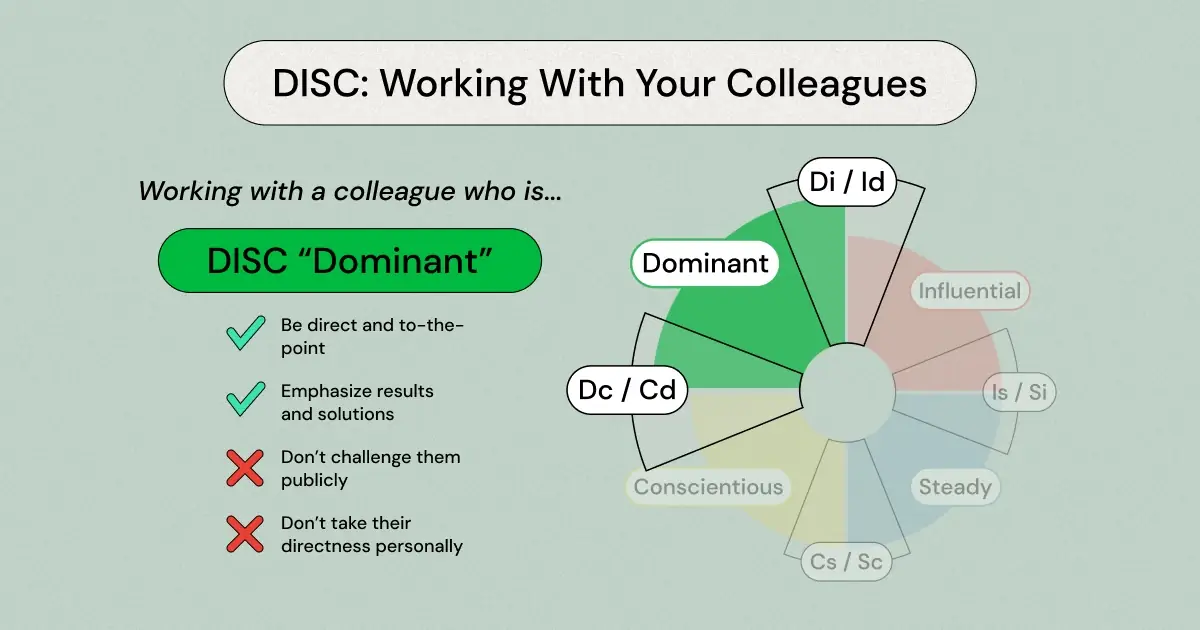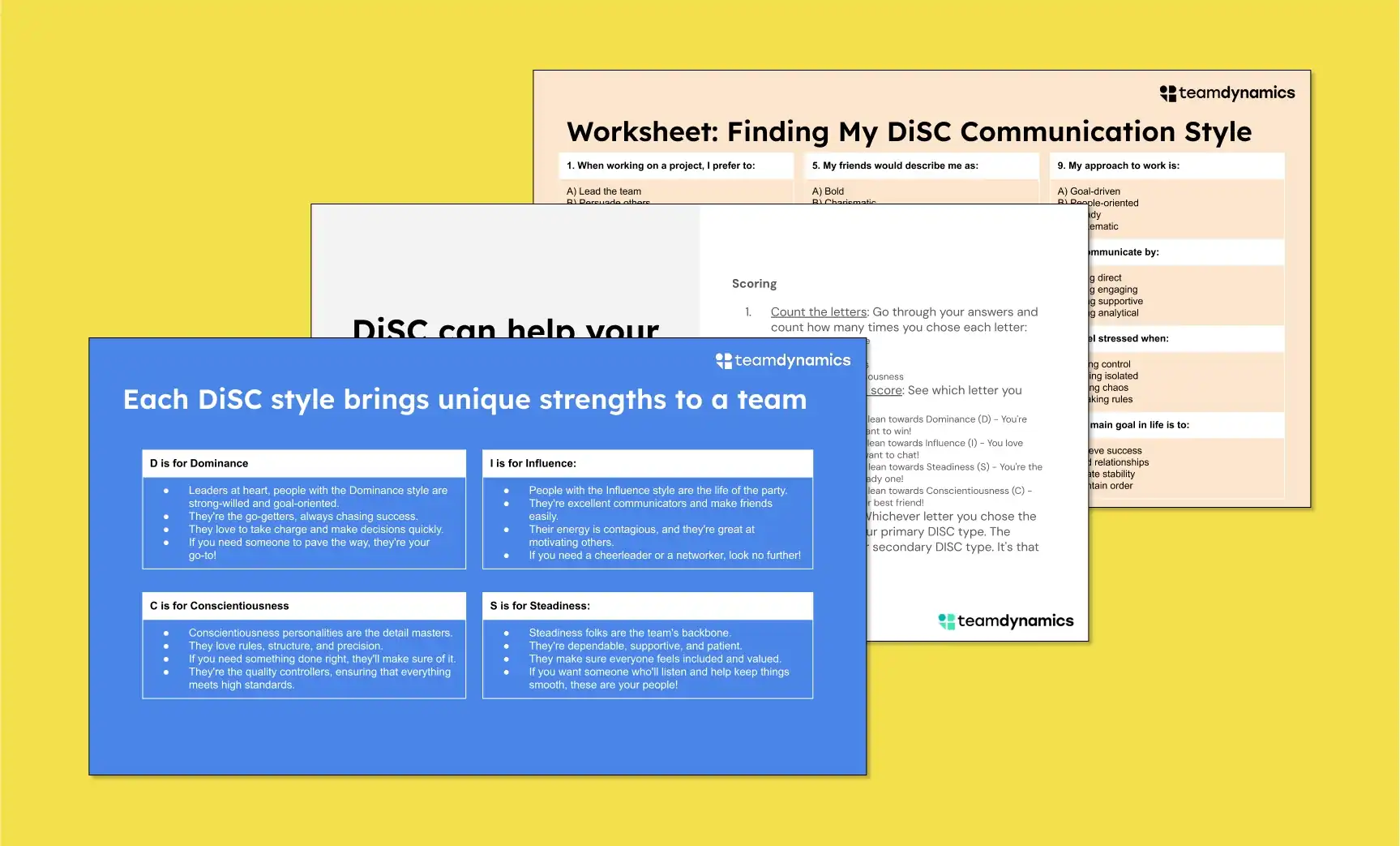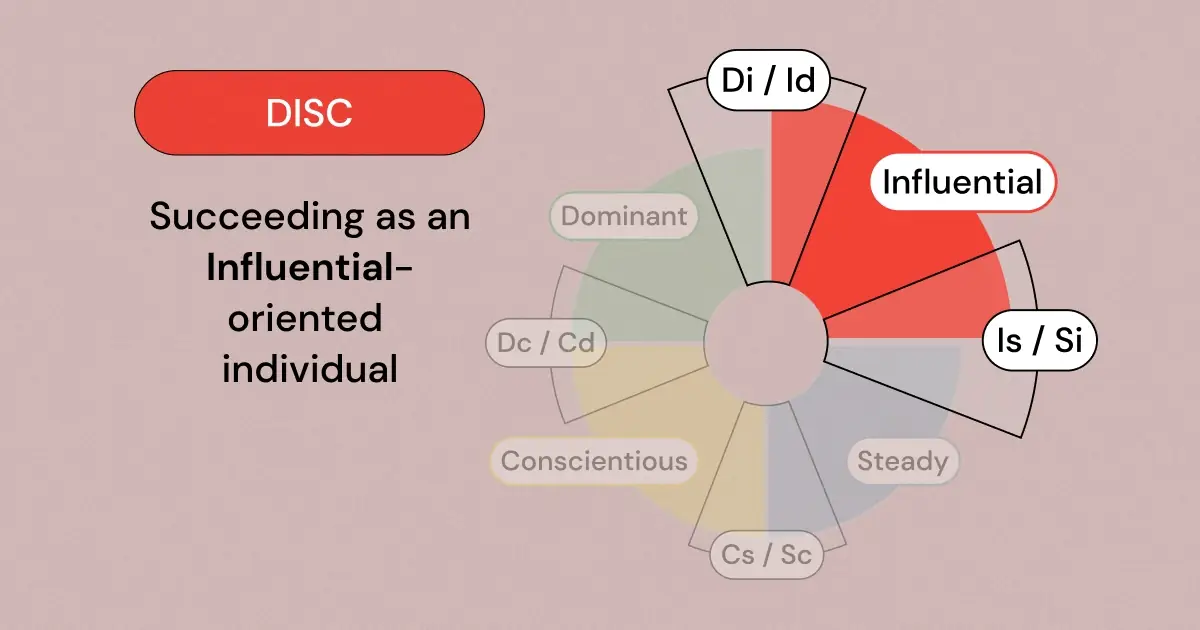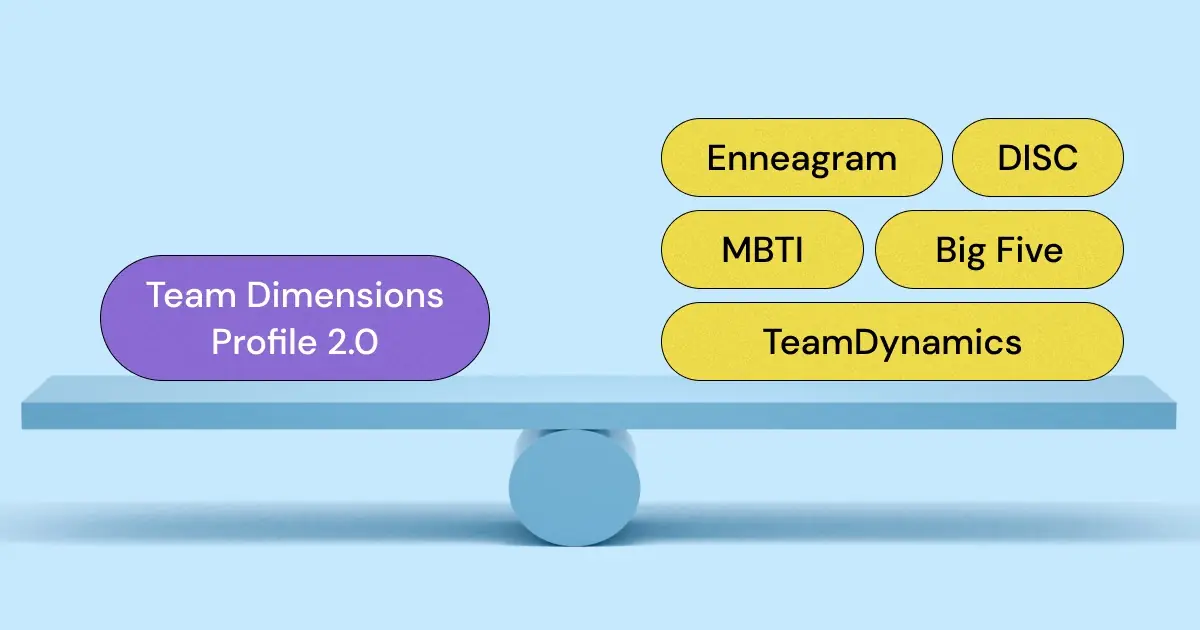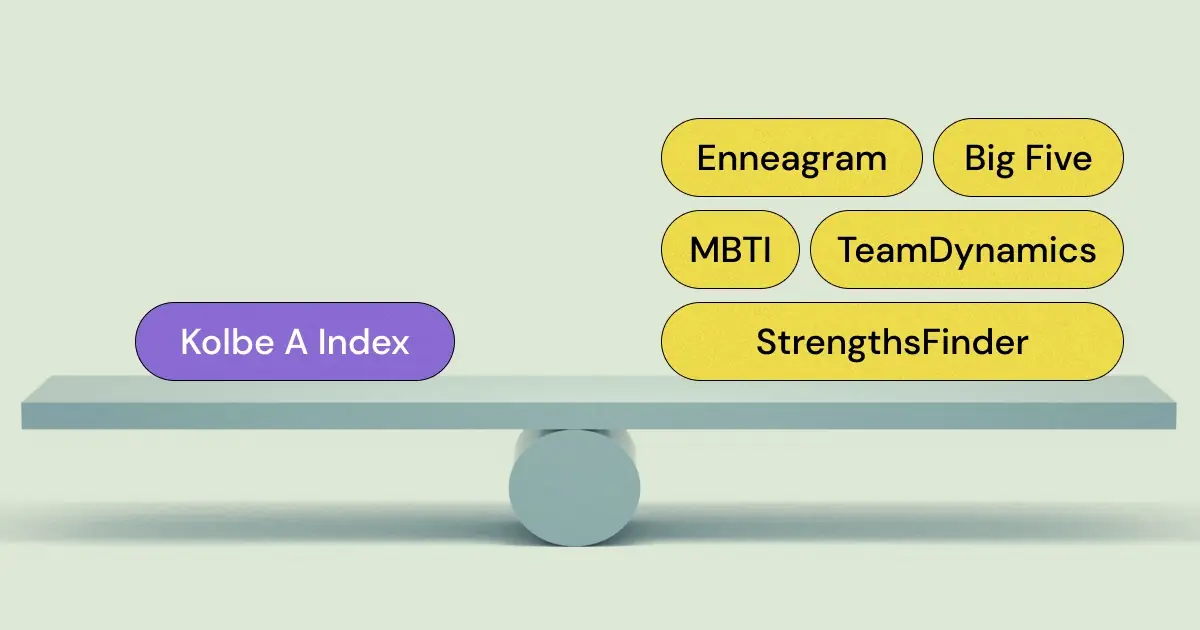Welcome to the dynamic world of workplace personalities! If you've ever taken the DISC personality assessment, you know it's a fascinating tool that sheds light on how we interact in professional settings. Today, we're zooming in on one specific trait that often sets the tone in teams, particularly in high-stakes environments like marketing, tech startups, and consulting: the "Dominant" personality.
In the dance of office dynamics, "Dominant" personalities are like the confident lead dancers. They're assertive, they make decisions quickly, and they keep their eyes firmly on the prize. But how do you dance in step with them without stepping on their toes? That's exactly what we're here to explore.
Why focus on "Dominance"? Because understanding and effectively interacting with a "Dominant" boss or colleague on the DiSC assessment can be a game-changer for your career. It can mean the difference between a harmonious, productive work environment and one where you feel like you're constantly trying to catch up.
In this post, we're diving deep. We'll start by helping you spot a "Dominant" personality in your workplace. Then, we'll walk through practical, real-world strategies for working alongside them – not just to get by, but to thrive. Whether they lean towards the ambitious "Di" (Dominant-Influential) or the meticulous "Dc" (Dominant-Conscientious), we've got you covered.
Are you looking for a tool to help you understand how your team works and improve its performance? Consider trying TeamDynamics, the personality test for modern teams.
So, buckle up! You're about to learn how to navigate the challenges and harness the strengths of working with some of the most driven individuals in the professional world. Let's turn these insights into your stepping stones for success!
Spotting the "Dominant" Dynamo in Your Team
Ever been in a meeting where one person seems to take charge naturally, steering the conversation and making quick decisions? That's likely your "Dominant" personality in action. In the realm of the DISC assessment, these individuals are the powerhouses driving many teams and businesses forward. Recognizing them is the first step in harnessing the energy they bring to the table.
Key Characteristics of a "Dominant" Personality:
- Decisive Action-Takers: They don't just make decisions; they make them quickly. Hesitation isn't in their vocabulary. When a "Dominant" person decides on a course of action, they commit to it fully.
- Confident Communicators: They speak with authority and confidence. Their communication style is direct, often assertive, and they don't shy away from tough conversations.
- Goal-Oriented Go-Getters: Give them a target, and they'll chase it down. "Dominant" personalities are focused on results and are often driven by achievement and competition.
How to Tell If Your Boss or Colleague is "Dominant":
- They lead discussions and are often the first to voice opinions or solutions.
- They prefer leading rather than following and are often in charge of projects or teams.
- They are less patient with delays or indecisiveness and push for progress and results.
Understanding that you're working with a "Dominant" personality can be incredibly empowering. It's like having a roadmap to better communication and more effective collaboration. By recognizing these traits, you can tailor your approach to align with their driven nature, ensuring smoother interactions and a more productive working relationship.
In the following sections, we'll dive into specific strategies for working effectively with "Dominant" individuals, including those with a sprinkle of influence ("Di") or a dash of conscientiousness ("Dc"). Stay tuned, because these insights are about to make your professional life a whole lot easier!
{{inline-cta}}
The Dos and Don'ts of Engaging with "Dominant" Personalities
Navigating the waters of working with a "Dominant" personality in the workplace can be challenging, but it's also an opportunity to grow and learn. Understanding the right approach can turn potential conflicts into productive collaborations. Here are essential strategies to keep in mind:
The Dos of Working with "Dominant" Colleagues:
- Communicate With Clarity and Brevity: "Dominant" individuals appreciate straight-to-the-point communication. Be clear, concise, and articulate in your interactions. Long-winded explanations or beating around the bush can lead to frustration. Speak their language: brief, direct, and impactful.
- Display Confidence and Competence: Confidence resonates with "Dominant" personalities. Approach your tasks and interactions with a sense of confidence. Show that you are capable and prepared. This doesn't mean being aggressive; rather, it's about showing that you're competent and can be relied upon.
- Be Solution-Oriented: "Dominant" types are all about results. When presenting a problem, also bring potential solutions. This proactive approach shows that you're not just identifying issues but are also thinking ahead about how to solve them.
The Don'ts of Working with "Dominant" Colleagues:
- Avoid Passive or Indecisive Behavior: Hesitation or a lack of decisiveness can be particularly off-putting. "Dominant" personalities value quick thinking and decisiveness. If you're unsure, it's better to seek clarification than to appear indecisive.
- Don't Take Directness Personally: Their directness isn't usually personal; it's just their way of communicating. Understanding this can help you interact without feeling offended or intimidated. It's all about the task, not about you as an individual.
- Don't Push Back Without Substance: If you need to challenge their ideas, come prepared with solid reasoning or data. Challenges based on well-thought-out rationale are more likely to be respected than emotional or unsubstantiated objections.
By adopting these strategies, you'll find that working with a "Dominant" boss or colleague can be a rewarding experience. It's all about understanding their perspective and aligning your approach accordingly. Stay tuned, as we next explore how to specifically interact with "Di" (Dominant-Influential) and "Dc" (Dominant-Conscientious) types for even more tailored workplace success.
Tailoring Your Approach for "Di" (Dominant-Influential) Personalities
When you combine the assertive nature of a "Dominant" personality with the sociability of an "Influential" type, you get the "Di" personality - a dynamic force in any workplace. These individuals are not only driven but also charismatic and persuasive. Here’s how to collaborate effectively with them:
Engaging with "Di" Personalities:
- Match Their Energy and Enthusiasm: "Di" types are often energetic and passionate. Meet their enthusiasm with your own. When discussing ideas or projects, show a similar level of excitement and energy. This creates a vibrant atmosphere that "Di" personalities thrive in.
- Embrace Creativity and Big-Picture Thinking: They love innovative, out-of-the-box thinking. Don't be afraid to bring creative ideas to the table. "Di" personalities are often attracted to bold, visionary concepts and appreciate those who can think big alongside them.
- Communicate with Positivity and Openness: A positive, open communication style works well with "Di" individuals. They are often persuasive and like to inspire others. Engaging in an open, positive manner helps build rapport and facilitates more effective collaboration.
Avoiding Pitfalls with "Di" Personalities:
- Don’t Dwell on Details: While details are important, overly focusing on them in initial discussions can be a turn-off. "Di" personalities are more interested in the big picture and overarching goals. Save the nitty-gritty details for later stages of project planning.
- Avoid Being Too Reserved: A reserved or overly formal approach might not resonate with "Di" types. They prefer a more relaxed, interactive style. Engage with them in a way that's conversational and lively.
- Don’t Resist Change: "Di" personalities are often open to change and new ideas. Being resistant to change or too rigid in your approach can create friction. Be flexible and open to evolving ideas and strategies.
Understanding and adapting to the unique blend of dominance and influence in "Di" personalities can significantly enhance your working relationship. Their drive and enthusiasm, combined with your adaptability and creativity, can lead to exciting and productive collaborations.
Up next, we'll explore strategies for working with the "Dc" (Dominant-Conscientious) type – where assertiveness meets meticulousness for a powerful workplace combination.
Mastering Interaction with "Dc" (Dominant-Conscientious) Personalities
In the spectrum of the DISC personalities, the "Dc" type presents a fascinating blend of assertiveness from the 'Dominant' trait and the analytical, detail-oriented nature of the 'Conscientious' trait. This combination in a boss or colleague can lead to high standards and a drive for efficiency. Here’s how to work effectively with them:
Navigating the World of "Dc" Personalities:
- Present Information Logically and Factually: "Dc" individuals appreciate logic and facts. When you present information, ensure it's well-structured, backed by data, and clearly articulated. They value substance and precision over emotional appeals.
- Prepare for a Detail-Oriented Approach: They have a keen eye for details. Be prepared to delve into specifics and have your data and facts ready. "Dc" personalities respect thoroughness and a well-researched approach.
- Maintain Professionalism and Efficiency: "Dc" types respect a professional, efficient approach to work. Be punctual, meet your deadlines, and demonstrate your commitment to quality and efficiency in your tasks.
Avoiding Common Mistakes When Working With "Dc" Personalities:
- Don’t Skimp on Details: Avoid presenting vague or incomplete information. Lack of detail can be a red flag for "Dc" personalities, as they rely on thoroughness and accuracy to make decisions.
- Avoid Emotional Decision-Making: While emotions are a part of human interaction, "Dc" personalities prefer decisions based on logic and facts. Focus on rational arguments and factual data when discussing proposals or plans.
- Don’t Resist Their Critical Approach: "Dc" personalities can be critical, especially when it comes to ensuring quality and standards. Don’t take their criticism personally. Instead, view it as an opportunity to improve and refine your work.
Working effectively with "Dc" personalities means appreciating their drive for excellence and their meticulous nature. By aligning with their approach, you can create a harmonious and productive working relationship that not only values efficiency but also strives for high-quality outcomes.
Overcoming Challenges and Building Strong Bonds with "Dominant" Personalities
Working with a "Dominant" personality in the workplace can be both challenging and rewarding. These individuals push for results and can drive significant progress, but their assertive style may sometimes create tension. Here's how to navigate these challenges effectively and build a strong, productive relationship.
Tackling Challenges with "Dominant" Personalities:
- Handle High-Pressure Situations with Confidence: "Dominant" personalities often create high-energy, high-pressure environments. It's crucial to maintain your composure and respond with confidence. Show that you can handle pressure and are capable of meeting challenges head-on.
- Demonstrate Competence and Reliability: They respect competence and reliability. Consistently deliver quality work and meet your deadlines. Demonstrating your ability to perform reliably builds trust and respect in your professional relationship.
- Differentiate Between Professional and Personal Feedback: "Dominant" individuals can be forthright with feedback, which might sometimes seem harsh. Learn to differentiate between professional criticism aimed at work performance and personal feedback. Focus on using constructive criticism to improve and grow.
Avoiding Common Missteps When Working with "Dominant" Personalities:
- Don’t Take Assertiveness Personally: Their assertive nature is often task-focused, not personal. Avoid taking their directness or urgency to heart. Understanding this can help maintain a positive working relationship.
- Avoid Unpreparedness and Indecisiveness: Coming to meetings unprepared or showing indecisiveness can be detrimental. Be well-prepared and clear in your decision-making. "Dominant" personalities value decisiveness and well-thought-out plans.
- Don’t Resist Change Without Reason: They often drive change to achieve results. Avoid resisting change without valid reasons. If you have concerns, present them logically and constructively.
Navigating a relationship with a "Dominant" boss or colleague successfully requires understanding their drive for results and adapting your approach to complement their style. By embracing these strategies, you can turn potential challenges into opportunities for professional growth and productive collaboration.
Conclusion: Embracing the Strengths of "Dominant" Personalities for Workplace Success
As we wrap up our exploration into working with "Dominant" personalities in the workplace, it's clear that understanding and adapting to different personality types is not just beneficial—it's essential for professional success. The insights gained from the DISC assessment, particularly regarding "Dominant" personalities, are invaluable tools in navigating the complexities of workplace dynamics.
The key takeaway? Embracing the strengths and challenges of "Dominant" personalities can transform your professional interactions. By understanding their drive for results, direct communication style, and preference for efficiency, you can tailor your approach to align with their expectations. This alignment not only smoothens day-to-day interactions but also paves the way for a productive, respectful, and mutually beneficial working relationship.
Remember, the goal isn't to change your personality to mirror theirs; it's about finding a balance. It's about leveraging your unique strengths while respecting their distinct approach to work. This mutual understanding fosters an environment where diverse talents and perspectives can coexist and thrive.
So, as you move forward in your career, carry these insights with you. Apply the strategies we've discussed, be adaptable, and watch as your professional relationships with "Dominant" individuals transform. The art of working effectively with different personality types, especially those as dynamic as the "Dominant" ones, is a skill that will serve you well in all your team interactions. Here's to your success in creating more harmonious, effective, and empowering workplace relationships!


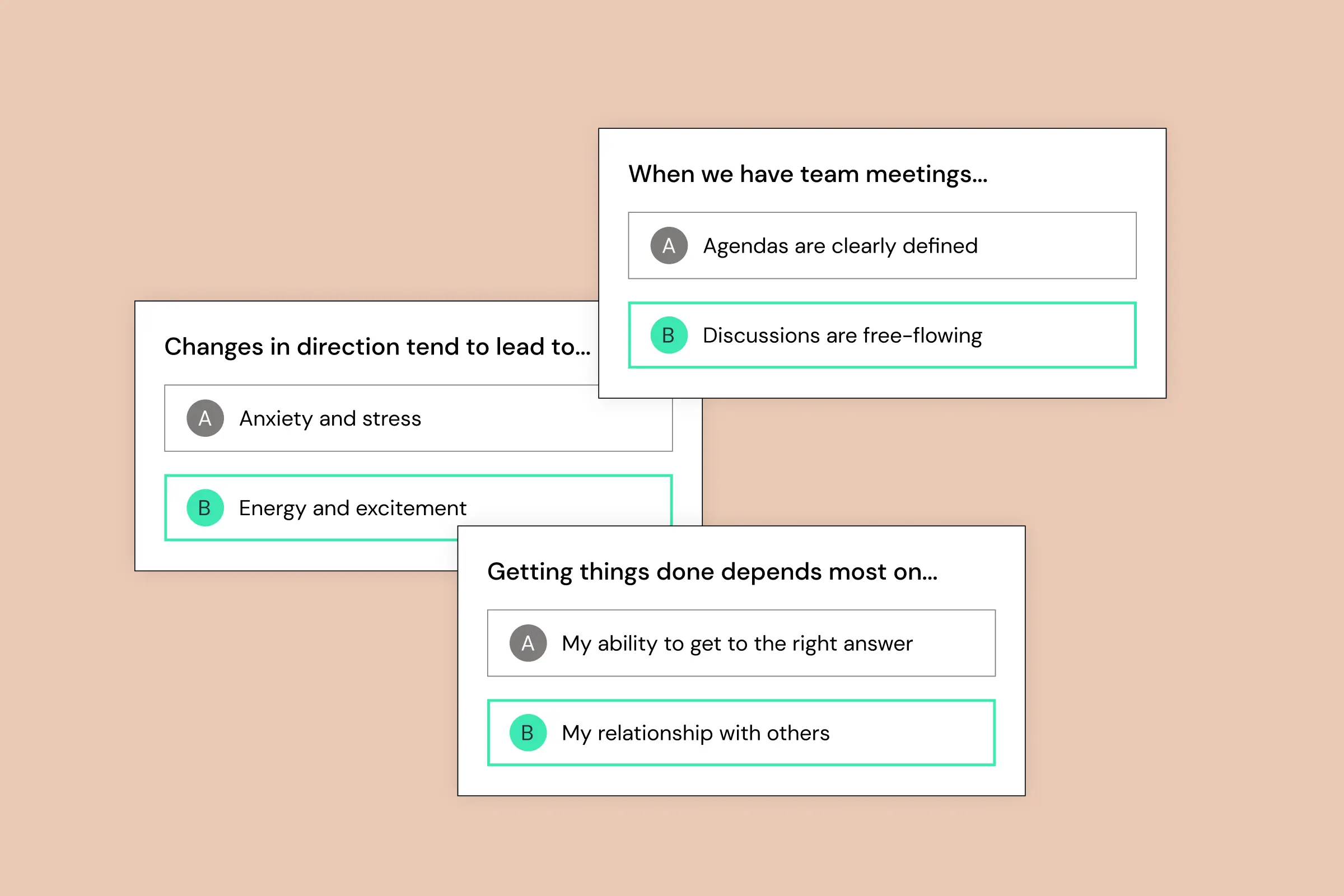

.png)
